FIRE SAFETY ON BOATS
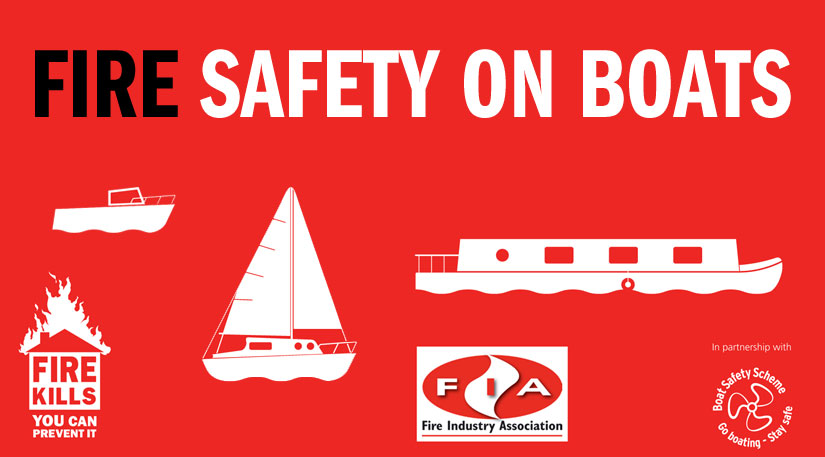
Did you know?
Fires on boats have killed 30 boaters in the last 20 years.
Most fires are preventable. This article provides tips and advice on how to protect your boat and crew from fire, and what to do should a fire break out.
Alarms save lives
Fire can spread quickly on a boat, even on water. Alarms can help keep your crew safe.
Smoke Alarms
- Optical sensor alarms with hush buttons and ‘sealed for life’ batteries are best for boats. Visit www.boatsafetyscheme.org/fire for advice and guidance.
- Fit alarms in places you will hear them clearly if they go off.
- Consider installing linked alarms that will go off at the same time.
- Test the alarm when you board and regularly when aboard. Never disconnect it or remove working batteries.
Gas leak indicators
- Fit a bubble type gas leak indicator in the LPG cylinder locker.
- Push the gas leak indicator test button routinely to check for leaks in the gas system.
Carbon monoxide (CO) alarms
- Fit a CO alarm to alert you of any poisonous carbon monoxide.
- Check your CO alarm is suitable for marine use and meets the EN50291-2 standard.
- Look out for any one of the approval symbols below when buying smoke and CO alarms.
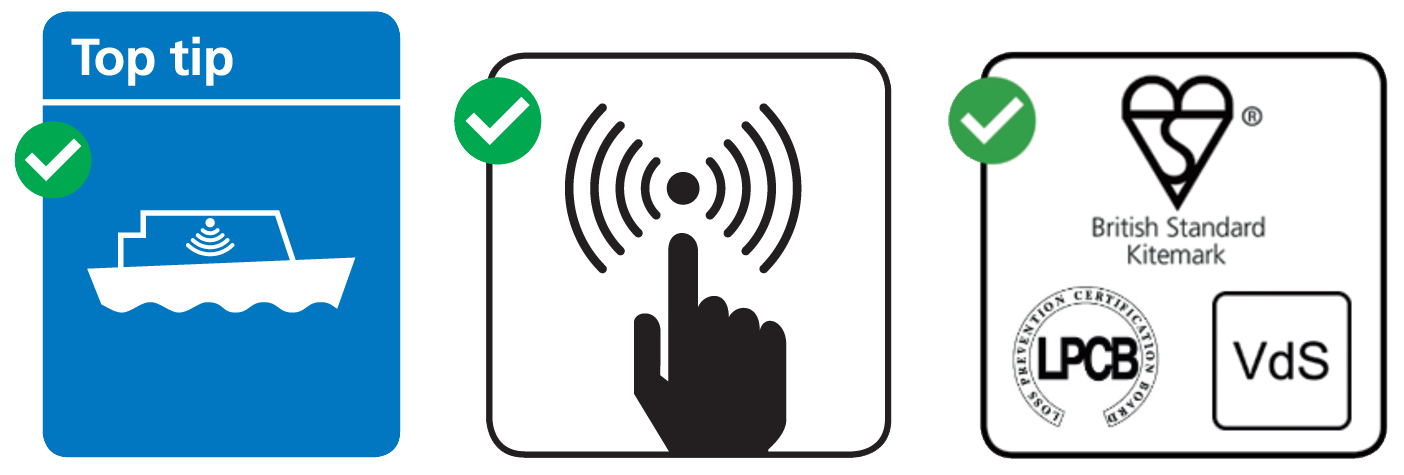
Fit alarms to stay safe
Safe Cooking
Turn cooking appliances off properly after use.
- Never leave cooking unattended. Turn things off until you come back.
- Take extra care when cooking with oil – it sets alight easily.
- Avoid cooking when tired. Remember, prescription drugs and alcohol can cause drowsiness.
- Keep the cooking area clean for safety – a build-up of grease could catch light.
- Spark devices are safer than matches or lighters to light gas cookers, because they don’t have a naked flame.
- Only use portable appliances onshore and don’t change gas canisters inside the cabin or covered areas.
- Barbecues shouldn’t be used on boats – hot charcoal gives off dangerous amounts of CO and blown embers could set your boat alight.
- Keep cabin ventilation clear to prevent a build-up of toxic CO.
- Try to keep fabrics away from cooking hobs to prevent them from catching fire.
- Damaged stoves and flues could burn too hot; check adjacent areas for heat damage. Have your chimney swept regularly.
- Dispose of embers carefully. If they’re still warm they could cause a fire or build-up of CO.
- Only use the fuel recommended by the heater manufacturer. Other types may burn too hot.
- Ensure all hob burners have a flame supervision device to shut-off the gas if the flame is blown out.

Turn appliances off properly after use
Protecting the inside of your boat
Dispose of cigarettes carefully.
Put them out, right out.
Cigarettes
- Keep cigarettes away from anything that could catch fire, such as curtains.
- Never smoke when refuelling or changing a gas cylinder.
- Use a proper ashtray that will stay stable on the boat.
- Take extra care if you smoke when you’re tired and never smoke in bed.
- Empty ashtrays regularly. A build-up of ash could catch fire.
Furnishings
- Try to choose furniture that carries the fire-resistant label.
- Keep fabrics and paper away from anything hot like hobs, light bulbs, stoves and their flue pipes.
- Watch out for domeddecklights, aka bullseyes, focussing light rays and causing heat damage or fires in strong sunlight.
Candles
- Candles have started fatal boat fires. Consider using LED alternatives for light or ambience.
- Pot-purri and oil-reed diffusers are far safer alternatives to scented candles.
- If you must use lit candles, ensure they’re in secure fireproof holders and never leave them unattended.
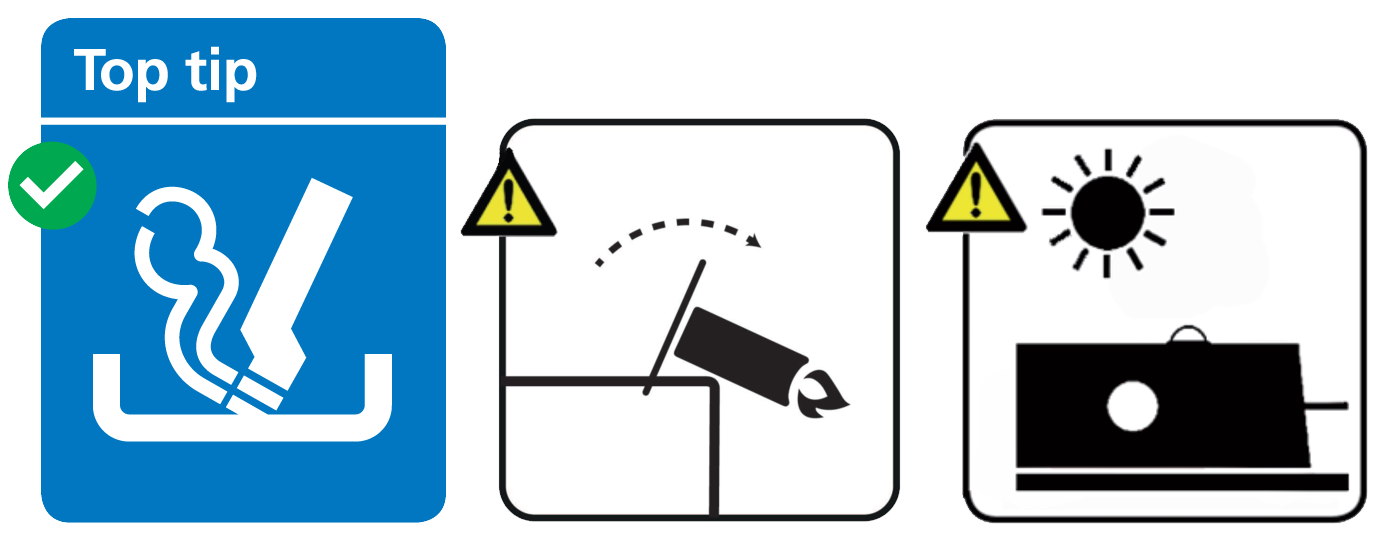
Put cigarettes out properly
Fuel & power safety
Make sure you check and maintain your boat’s fuel, gas and electrical systems on a regular basis
Engine Maintenance
- Don’t let oil or debris build-up in the bilges.
- Inspect the lagging of engine and heater exhausts for damage or deterioration; and check nearby items for heat damage or charring.
- Check exhaust systems of inboard engines for leaks.
- Check for loose fuel joints, damaged fuel tanks or deteriorating hoses.
Fuel Safety
- Prevent petrol vapour from entering the boat by closing the doors, windows or hatches and closing the awning.
- Refuel outboard engines and generators well away from the boat.
- Leaks, spills and vapour can ignite easily. Clean them up straight away and make sure filler caps are secure after refuelling.
- Only carry spare petrol if necessary and store it in a self-draining locker or on open deck.
- Petrol refuelling should only be supervised by someone familiar with both the boat and petrol vapour risks.
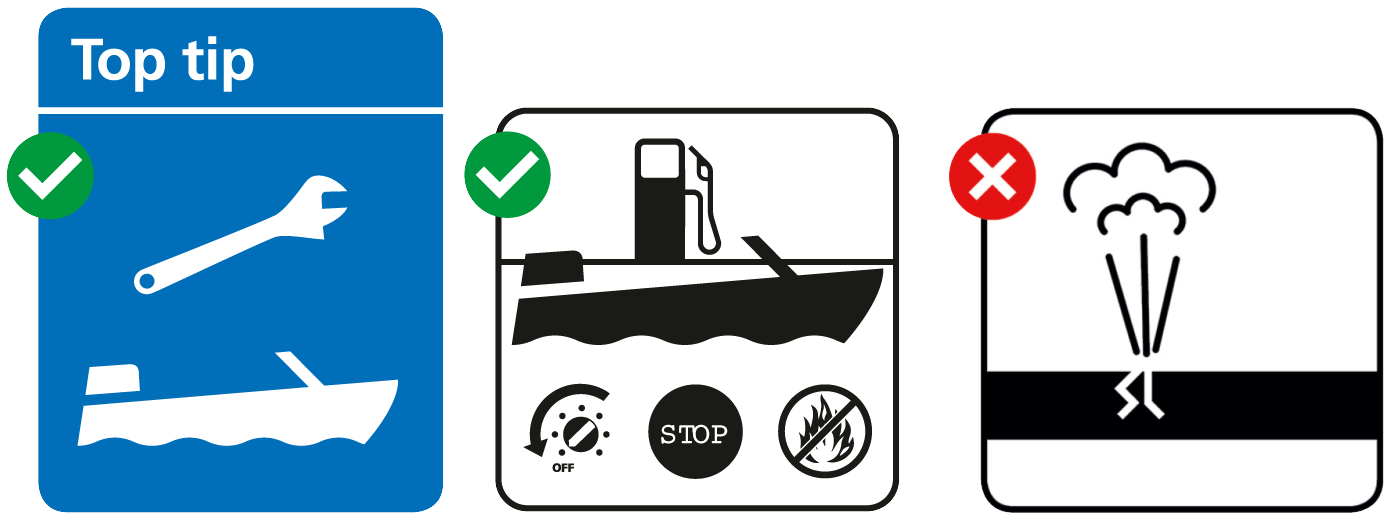
Maintain your boat’s engine & fuel systems regularly
If you can smell gas, turn the supply off and get it checked out straightaway!
Gas Safety
- Ensure gas appliances are installed and maintained routinely by trained fitters.
- Never restrict airflow by blocking vents or air gaps.
- Make sure gas cylinders are secure after they’ve been changed. Test for leaks with detection fluid.
- Whenever possible, turn gas valves off before you go to bed or leave the boat.
- Replace gas hoses showing signs of cracking, brittleness or discolouration.
- Store gas cylinders outside, in a self-draining and fire resistant locker. Keep them upright and secured from moving.
Electrics
- Check for the British or European safety mark when buying electrical goods.
- Use a trained marine electrician to install and service electrics.
- Don’t overload adaptors. Keep to one plug per socket. Use the right fuse or circuit breaker to avoid overheating.
- Unplug appliances when they’re not in use or when you leave the boat.
- Take extra care when reinstalling the boat’s batteries. Check straps or restraints are secure afterwards.
- Damaged wires and connectors can overheat rapidly, so look out for scorch marks or burning smells. Don’t ignore sounds like buzzing, fizzing or crackling.
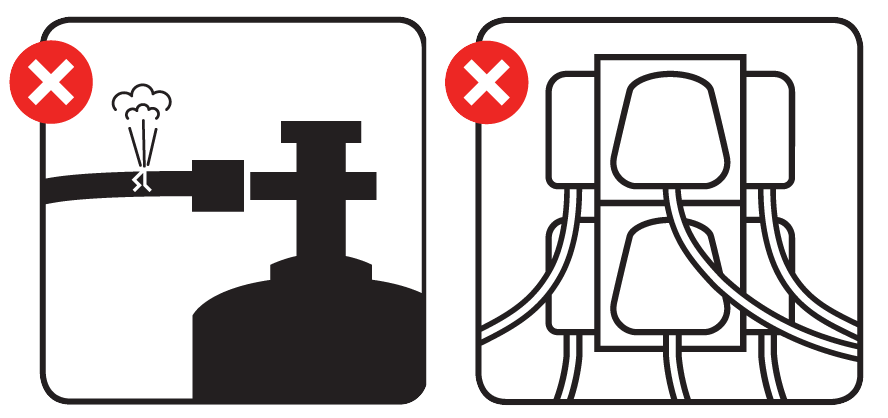
If there is any sign of a problem, turn the power off and don’t switch it on until it’s been checked out!
Plan a safe escape
Make an emergency plan with everyone on board before you set out.
- Make sure people know how to close emergency valves and switches in case of fire.
- You are more at risk from a fire when asleep, so check your boat before you go to bed. Make sure cooking and heating appliances are off and candles and cigarettes are fully extinguished.
- Keep a torch easily available to help you escape at night. Make sure you have spares and test them regularly.
- Don’t go to sea without a VHF radio. Have a chargedup, handheld, waterproof one ready for use at any time.
- Don’t rely on a mobile phone. There could be no signal and it may not be waterproof.
- Have enough life jackets for everyone on board, and keep them in good condition.
- Keep exits clear and keys to hand. Don’t lock or bolt doors and hatches from the outside.
- Track your location so you can tell the emergency services where you are if needed.
- Consider having a ‘grab-bag’ for removing vital possessions in an emergency.
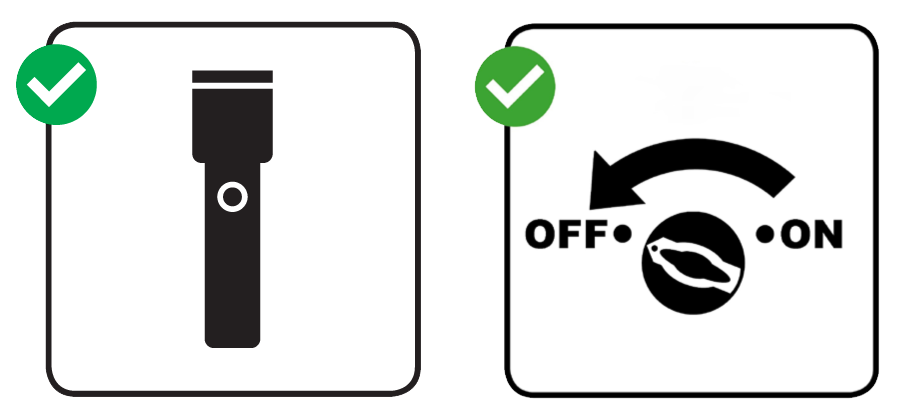
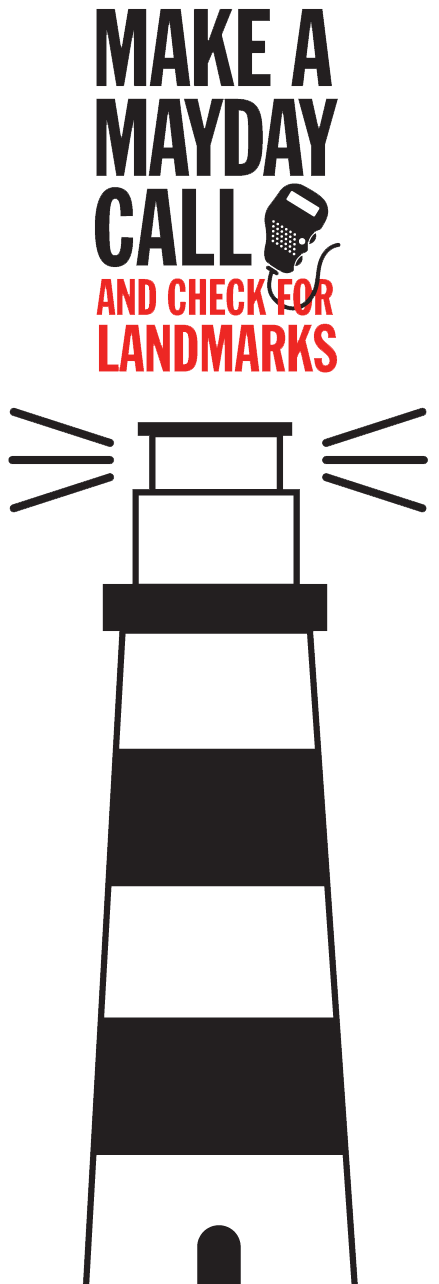
What to do if there’s a fire
If in doubt, don’t fight a fire yourself. Get out, stay out, call for help and wait for the fire & rescue services.
- Do not enter a smoke filled space.
- If you are already in a smoke filled space, keep low down where the air is clearer.
- If you need to break glass to escape, use a blanket to prevent injury.
- Starve the fire of air. Don’t open engine hatches or doors unless you have to.
Inland Fires
- If you are inland or moored near to land, move everybody off the boat and call 999 immediately.
Fires at Sea
- If you are off-shore move as far away from the fire as you can on deck. Get everybody into life jackets.
- Take a handheld VHF radio onto deck with you to call for help.
- Notify the Coastguard by radio, make a Mayday call and/or display a distress signal.
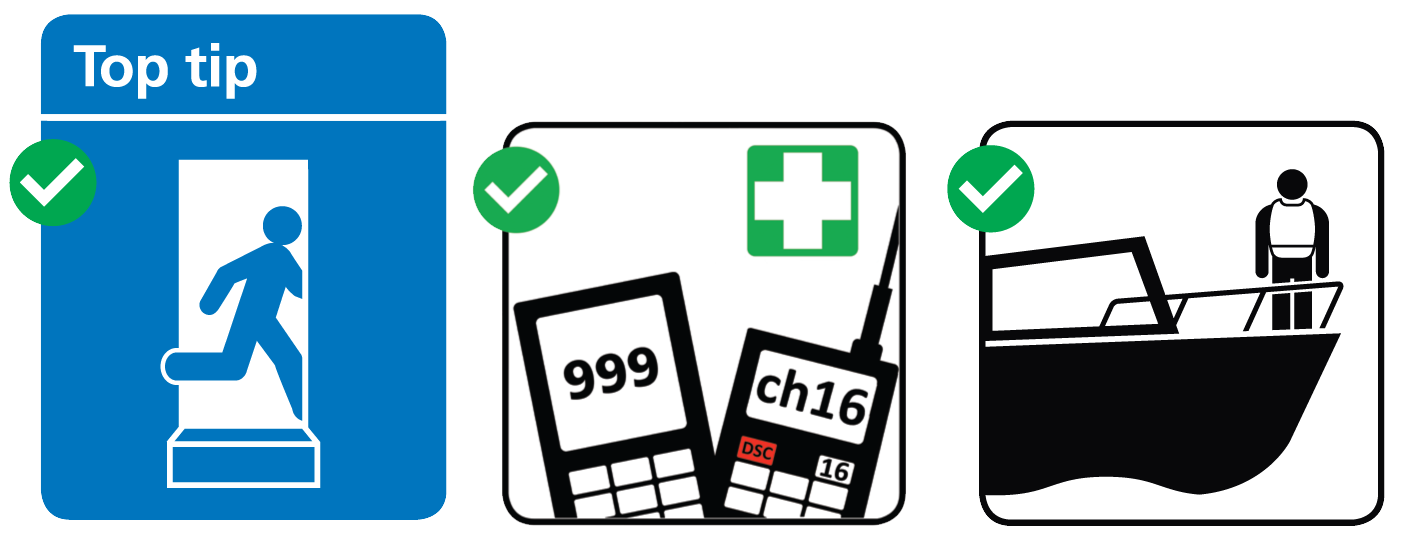
Get out, stay out and call the emergency services!
Fire blankets and extinguishers
To extinguish a small fire, or to help you escape safely, consider using an extinguisher.
- Familiarise yourself with how to use any extinguishers on board.
- Only consider tackling a fire with an extinguisher if you are confident how to use it. If in doubt, evacuate the boat.
- Keep fire blankets and extinguishers within easy reach, close to exits and risk points, such as the galley and engine area.
- Check extinguishers on a regular basis for serious dents, leaks and loss of pressure.
- Check the pin and firing mechanism for any signs of problems or weaknesses.
- Check the dates on extinguishers and fire blankets. Have extinguishers serviced by a competent person, or replace them as recommended by the instructions.
- Only choose extinguishers that carry recognised approval marks such as those shown below.
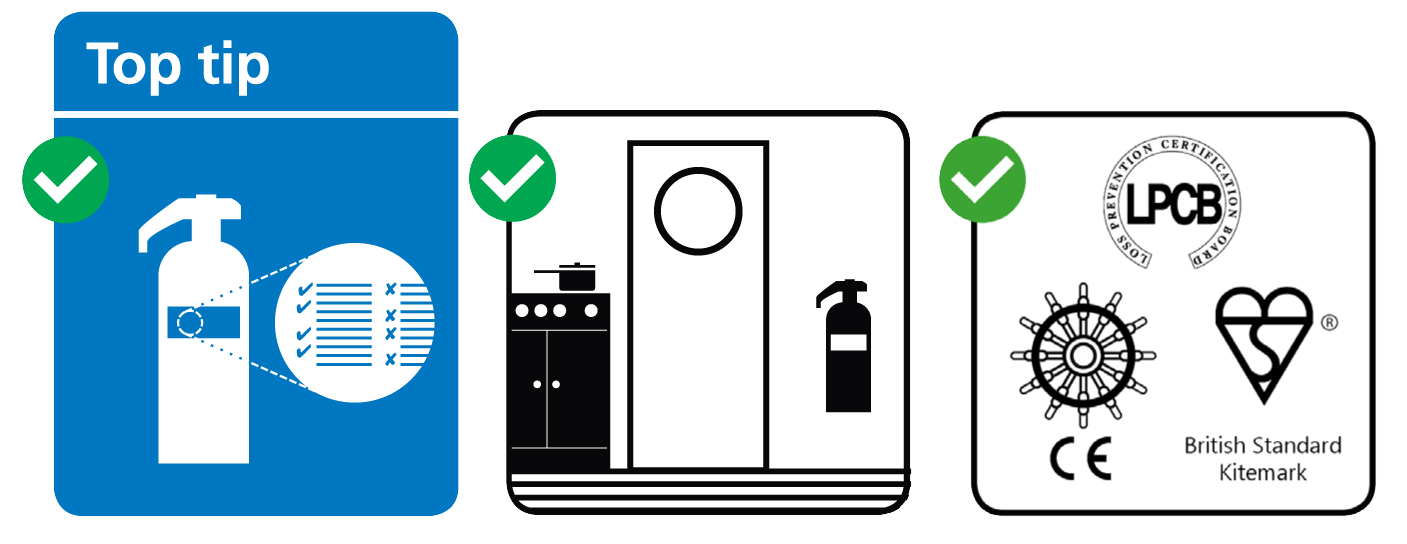
Always read instructions
Further information
- For more information on boat fire safety and routine safety checks visit www.boatsafetyscheme.org/fire
- For more information on carbon monoxide and CO alarms visit www.boatsafetyscheme.org/co
- For information on sea regulations and emergencies at sea visit the Maritime and Coastguard Agency at www.gov.uk/mca
- For more information on electrical safety visit www.boatsafetyscheme.org/stay-safe/electrical-safety
- For advice, checks of emergency equipment and emergency rescue information contact Royal National Lifeboat Institute at www.rnli.org.uk
- For information about past incidents with lessons learnt, and for reporting accidents see Marine Accident Investigation Branch at www.gov.uk/maib
Boating Advice
- For boat builders and service engineers contact British Marine www.britishmarine.co.uk
- For advice on navigation, boat handling and emergency training contact the Royal Yachting Association www.rya.org.uk
General Fire Safety
- Contact your local fire and rescue service for free advice.
- For more information on fire safety visit www.facebook.com/firekills
Acknowledgements
Published with the generous support of the Fire Industries Association - promoting, improving and perfecting fire protection methods, products and services.
For more information on general fire safety visit www.facebook.com/firekills
FS07 Version 3.1 © Crown Copyright 2017.



